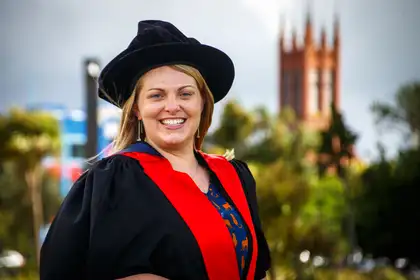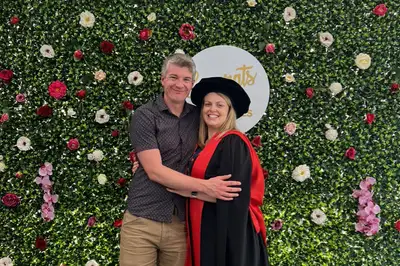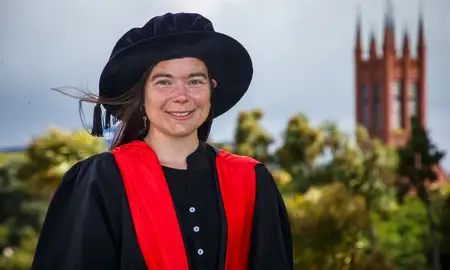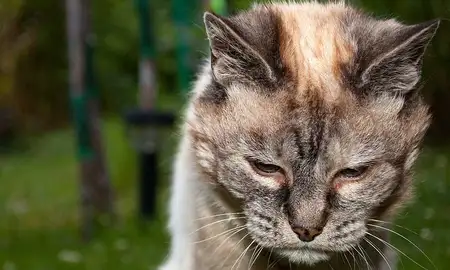
Dr Kat Littlewood.
Throughout the beginning of her career as a vet, Dr Kat Littlewood saw many complex cases and challenging moments which led her to question the scope of the role veterinarians have at the end of an animal’s life.
These experiences inspired her to look deeper into the relationship between vets and owners for her doctoral thesis.
“It’s up to owners to make end-of-life decisions, but it’s incredibly difficult to do. Often, they will involve their veterinarian in the decision-making process, making it essential that vets understand the role they play in the end-of-life management of animals. I often felt out of my depth when asked by owners when the best time to euthanise might be,” Dr Littlewood says.
The initial aim of her PhD research was to explore a quality-of-life instrument that would assist in making end-of-life decisions for small animals. She realised there were already a range of tools available, but none used consistently by owners or veterinarians.
“To develop a protocol for end-of-life decision making, I first needed to explore how vet students were being taught to manage the end of animal’s lives and how owners were currently making end-of-life decisions,” Dr Littlewood explains.
Through two studies, Dr Littlewood’s research aimed to answer the question: what is the veterinarian’s role in end-of-life management of older and chronically ill cats in New Zealand?
The first study investigated how aspects of end-of-life management, including technical euthanasia skills, end-of-life decision-making, and grief management, was taught at the eight vet schools in Australasia. The second study explored the role vets played in end-of-life management from the perspectives of owners. Dr Littlewood spoke to participants of the study about their experiences of euthanising their cat, what was involved in the decision-making process, and what role they believed their vet played.
The results revealed there was a disconnect between what owners expected of their vets and what vet students were learning. The study demonstrated gaps in the training students received which Dr Littlewood says if acknowledged and filled, will ensure new graduates meet client expectations of vet competency.
“I found technical aspects of euthanasia were not taught consistently for companion animals, and there were gaps in teaching end-of-life decision-making relative to what was important to cat owners. They expected their vet to be the expert when it came to knowledge of animal health and welfare, but not all vet students were taught how to assess animal welfare or quality of life in the context of end-of-life decisions.”
Grief management teaching was shown to encompass what cat owners wanted most from their vet, which the study revealed was often taught to vet students by student counsellors and psychologists in their earlier pre-clinical years. In some cases, these human-centred themes were not explicitly linked to the end-of-life decision making process, which Dr Littlewood says could lead vet students to not understand the capacity they have in this space.
“Without explicit alignment, vet students may be left thinking that as vets, they only have a limited role or even no role at all in managing their clients’ emotions and that it should be left to trained professionals. However, my cat owner participants emphasised the important role their vet played in the end-of-life process, suggesting that training, in New Zealand at least, is effective in this regard.”
While completing her thesis work, Dr Littlewood says she was surprised by how much she came to enjoy social science research.
“Coming from a vet background, I was much more comfortable with numbers and facts. But it was fascinating to find out how much data we could get out of interviews and the depth we could go into with qualitative data. I enjoyed talking to people and developing relationships with them. I’m very much focused on continuing using social science approaches to explore problems in how humans and animals relate to one another.”
Completing this PhD research formed part of Dr Littlewood’s training requirements to become a fellow of the Australian and New Zealand College of Veterinary Scientists in the subject of Animal Welfare Science, Ethics, and Law. This enables her to apply to be a vet specialist in this subject, and she is the only active vet with this qualification in Aotearoa New Zealand.
As part of her plan for the future, Dr Littlewood says she wants to continue teaching and undertaking research. She currently teaches undergraduate and postgraduate animal welfare, behaviour, ethics, and law.
“I’d love to stay in academia. I get a lot of satisfaction working with students, which was a big reason why I returned to study with Massey, and I enjoy working with postgraduate students and helping them develop their research careers. Not just the research, but the pastoral care and ‘other’ advice that comes with supervising great students.”
Dr Littlewood would like to express her gratitude to the cat owners who participated in this study. She says she couldn’t have done this without their enthusiasm for her research or without the love of her family.
“My mum, dad, and furry family always cheered me on. My incredible daughter Evie arrived part-way through my doctoral journey, and while there have been challenging times navigating this together, I am so lucky to call myself her mum. She’s made me laugh and cry, but most importantly, she’s taught me to focus on what matters most. And to my husband, Dr David Littlewood, this research would not have been possible without your unwavering support.”

Dr Kat Littlewood with her husband Dr David Littlewood, who is a lecturer in history at Massey.
Further thanks:
Dr Littlewood would like to extend her thanks to her supervisors Associate Professor Ngaio Beausoleil, Professor Emeritus Kevin Stafford, and Professor Chris Stephens; the members of the Animal Welfare Science and Bioethics Centre (AWSBC), particularly David Mellor, Craig Johnson, and Nikki Kells, as well as Sophia Holdsworth, Morgan Heslop, and Izzy Norris; and the New Zealand Veterinary Association, The Veterinary Council of New Zealand and Seton Butler, for their support and for sharing details of her studies to the veterinary community.
At Massey University, she’d like to thank the anonymous veterinary educators who agreed to be interviewed for her first study, Liz Norman for her veterinary social science research advice, and Debbie Hill for administrative support and being a general doer-of-all-things.
At the universities across Australia, she thanks the veterinary educator participants, and her representatives: Teresa Collins (Murdoch University), Susan Hazel (The University of Adelaide), Janice Lloyd (James Cook University), Catherine Mallia (Charles Sturt University), Leonie Richards (The University of Melbourne), Nicole Wedler (Murdoch University), Anne Quain (The University of Sydney), and Sarah Zito, for their time and efforts interviewing veterinary educators at their respective universities.
Related news
PhD graduate investigates the welfare of horses used for hands-on teaching
Dr Lauréline Guinnefollau’s thesis looked at the impact that hands-on educational activities have on Massey’s population of teaching horses.

Wellington celebrates 2022 graduates
More than 500 students will cross the stage at the Michael Fowler Centre on Tuesday 11 October at graduation ceremonies in Wellington.

Older cats – when to say goodbye?
A Massey researcher is looking for study participants who have euthanased their older cat in the past six months to better understand the interplay between veterinarians, animals and owners around the choice to euthanase.
